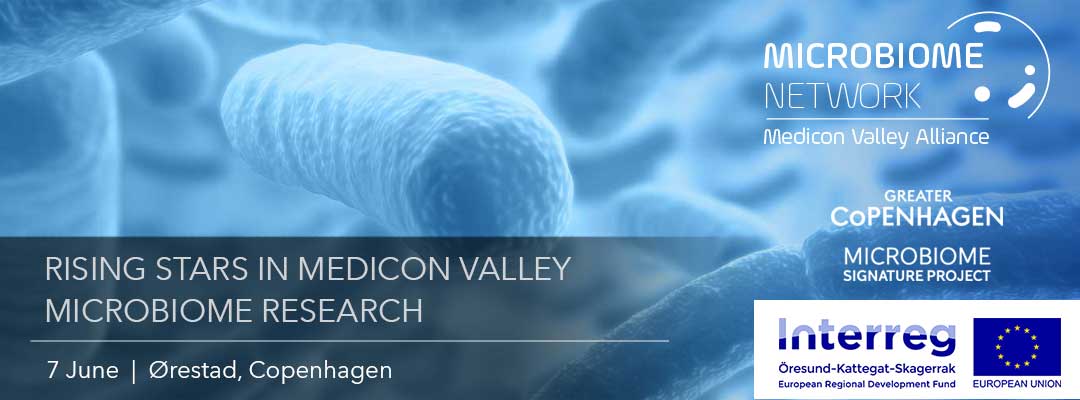The Medicon Valley Alliance Microbiome Network, in collaboration with the Microbiome Signature Project, have the pleasure to invite you to a network meeting on 7 June 2022 in Copenhagen, focusing on rising stars in microbiome research.
The network meeting will focus on some of the excellent research that is taking place in Medicon Valley within the Microbiome field, and we will hear from selected “rising stars” from University of Copenhagen, Lund University and Technical University of Denmark.
The network meeting will be followed by an afternoon session titled “Microbiome Signature Project: Outcomes and Future Outlook”, which is a concluding event for the Microbiome Signature Project that will summarise and reflect on the project’s key aims and outcomes from its engagement with international and regional microbiome stakeholders over the past 2+ years. The event will focus on recent investments and establishments in the region, international talent and include an exclusive presentation of a microbiome hub benchmarking study and a possible future microbiome platform for Medicon Valley.
The Microbiome Signature Project is a joint project between Medicon Valley Alliance, Copenhagen Capacity and Invest in Skåne, which seeks to position Medicon Valley as a leading hub for microbiome research.
The afternoon session requires a separate registration; you can find more information here. (Note: registration for the afternoon session has closed.)
Date: Tuesday 7th of June, 2022
Time: 10.00 – 12.30
Venue: Auditorium, HUB 3, Arne Jacobsens Alle 13, 2300 Ørestad City, Copenhagen
Cost: Free of charge and open to all
Registration has closed
Program:
| 10.00 – 10.20 | Arrival – registration and networking |
| 10.20 – 10.30 | Welcome and Introduction Anette Steenberg, CEO, Medicon Valley Alliance & Sünje Pamp, PhD, Novo Nordisk Foundation Center for Biosustainability, DTU Microbes Initiative |
| 10.30 – 12.15 | Presentations from Rising stars within Medicon Valley Microbiome research
Frida Fåk Hållenius, Associate Professor, Lund University Henrik Munch Roager, Associate Professor, University of Copenhagen Louise Brunkwall, Postdoc, Lund University Patrick Munk, Assistant Professor, National Food Institute, Technical University of Denmark Mathilde Nordgaard Christensen, Postdoc, DTU Bioengineering, Technical University of Denmark Andrew Williams, Associate Professor, University of Copenhagen |
| 12.20 – 12.30 | Q&A and concluding remarks |
| 12.30 | Lunch and networking |
| 13.30-17.30 | Microbiome Signature Project: Project Outcomes and Future Outlook
This session is open to all but requires a separate registration. You are welcome to find out more here. |
Moderator:

|
Sünje Johanna Pamp, PhD, Novo Nordisk Foundation Center for Biosustainability, DTU Microbes Initiative
Sünje Johanna Pamp has 20+ years of experience in microbiology and microbiomes as an active scientist, manager, teacher, examiner, advisor, and founder. She has been involved in interdisciplinary collaborations with over 50 institutions in more than 30 countries. Her research involves the integration of approaches from genomics, microbial ecology, evolution, classical & molecular microbiology, and clinical & veterinary medicine to provide insight and solutions related to human & animal health and disease. |
Speakers:
 |
Henrik Munch Roager, Associate Professor, University of Copenhagen
Henrik Munch Roager is an Associate Professor and Head of the Gut Microbes, Diet and Health research group at the Department of Nutrition, Exercise and Sports, University of Copenhagen. He and his group seek to understand the mechanisms by which the gut microbiota contributes to food digestion and health. |
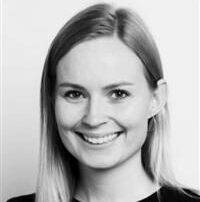 |
Mathilde Nordgaard Christensen, Postdoc, DTU Bioengineering, Technical University of Denmark
In Mathilde’s research, she study how microbes interact with plants with the overall aim to develop microbial biocontrol agents as a sustainable alternative or supplement to the use of chemical pesticides for crop protection within the agriculture industry. In her PhD, Mathilde focused on the plant growth-promoting rhizobacterium B. subtilis and studied how this bacterium interacts with and adapts to the roots of the model plant Arabidopsis thaliana. |

|
Patrick Munk, Assistant Professor, National Food Institute, Technical University of Denmark
Patrick Munk is an Assistant Professor in the Genomic Epidemiology research group at the National Food Institute, Technical University of Denmark. He uses genomic techniques, including metagenomics, to study the ecology and epidemiology of antimicrobial resistance genes across One Health settings. He has worked especially with developing resistance monitoring in livestock feces and sewage from 100+ countries. |
 |
Frida Fåk Hållenius, Associate Professor, Lund University
Frida Fåk Hållenius’s research focuses on modulation of the gut microbiota using tailored food concepts to prevent metabolic and neuroinflammatory conditions. Presently, Frida is PI for NeuroFood, a 3-year FORMAS project, where the crosstalk between microbial DNA in the gut and brain, the innate immune system and food components is explored in models for Alzheimer’s disease. |
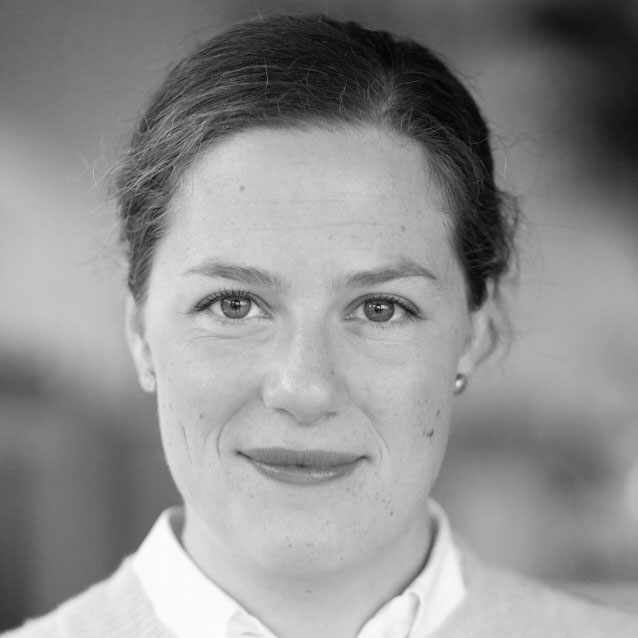 |
Louise Brunkwall, Postdoc, Lund University
Louise is a postdoc in the group Diabetes, Cardiovascular disease and genetic epidemiology at the department of Clinical Sciences. Her Phd focused on obesity, diet quality and the gut microbiota. Louise’s has continued to study the gut microbiota in an epidemiological setting and large population-based cohorts. |
 |
Andrew Williams, Associate Professor, University of Copenhagen
Andrew Williams is Associate Professor in the Department of Veterinary and Animal Sciences at the University of Copenhagen, and head of the Parasites, Immunology and Gut Health Group. His group works on understanding the interactions between dietary components, the host microbiome, and pathogen infections in the gut. He obtained his PhD from the University of Western Australia and carried out postdoctoral studies in Oxford and Copenhagen before being appointed to his current position in 2017. |
Deadline for registration is 1st of June.
The Network
The MVA Microbiome Network is a professional network for Medicon Valley Alliance members from industry, academia and health care sector with interest in the Microbiome field, including drug discovery, nutrition and probiotic development. Our ambition with the MVA Microbiome Network is to create opportunities for microbiome researchers from industry, academia, and health care to meet and collaborate. Joining the network is free of charge but is limited to Medicon Valley Alliance members. However, non-member organizations and companies are welcome to attend one network event to evaluate if joining the network is relevant. If so, becoming a member of Medicon Valley Alliance will automatically allow you to join the microbiome network.
For more information please contact Sofia Norås sn@mva.org
| Supported by | |||
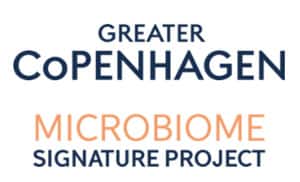 |
| In Collaboration with | |||
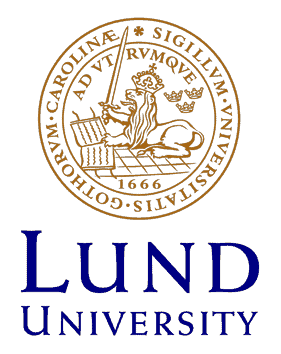 |
 |
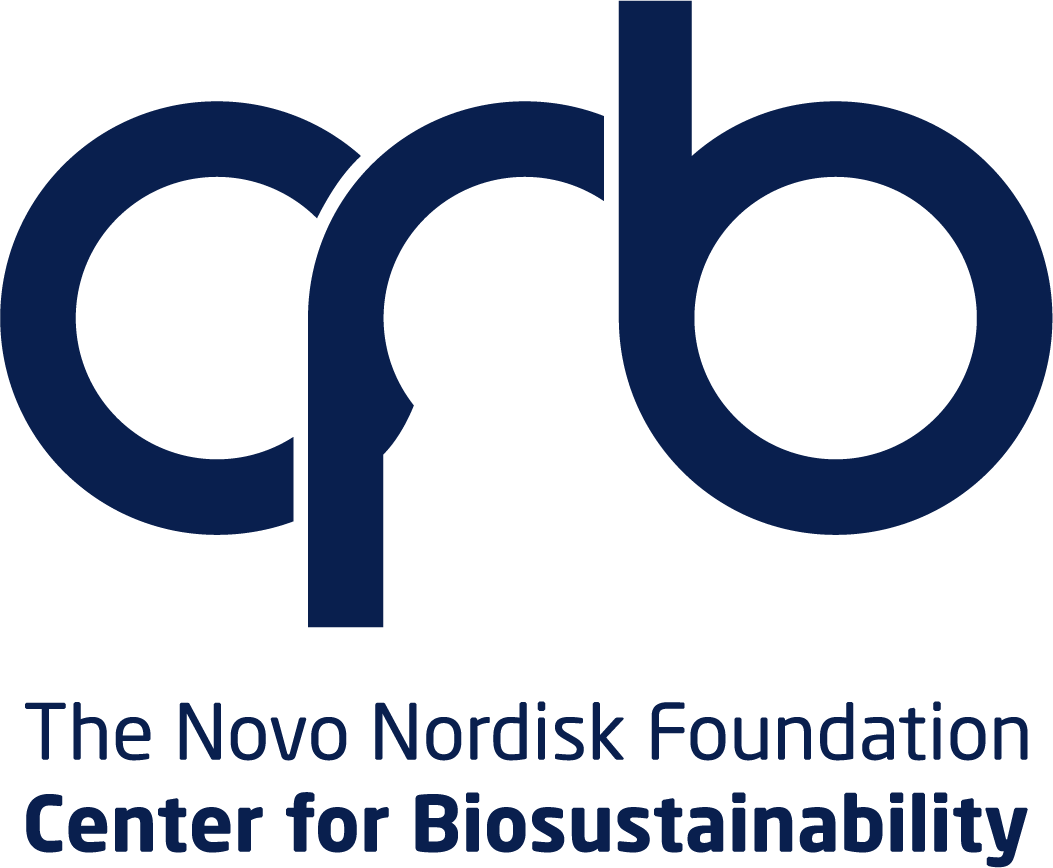 |
